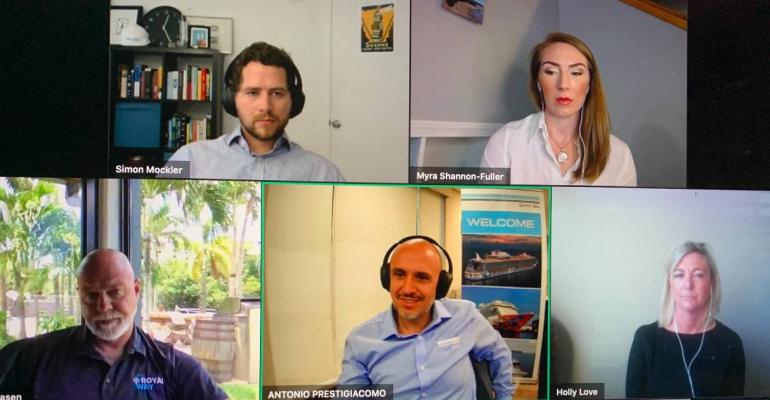It's a challenge the whole industry faces, according to Anders Aasen, VP global technical solutions, Royal Caribbean Group, since many crew have found jobs ashore in their own countries during the shutdown.
The difficulty is not so much with the shipboard leadership positions, Aasen said, but with rank and file crew.
'It's not been easy to get crew,' concurred Holly Love, VP medical operations, Vikand Solutions.
Crew vaccination
Plus, 'access to approved vaccines for our crew is still very difficult,' she said, along with the lack of consistency in documentation requirements for vaccination.
Crew vaccination seems to be proceeding well in the US, at least, where cruise ports in Florida, Texas, Alabama and California have stepped up, with thousands of crew inoculated. (Port Canaveral alone, for example, has vaccinated approximately 4,000 cruise ship crew.) But that's not the case everywhere in the world.
And Seatrade Cruise News has been told that, stateside, some ships' restarts are delayed not specifically by the Centers for Disease Control and Prevention process, which they're laboring through, but by crewing.
Crew mental wellness
Meanwhile, on the DNV webinar Love noted it's been very stressful for mariners who've remained on board during warm layup, with their contracts extended due to travel prohibitions, uncertainties about COVID-19, and the need to quarantine, sometimes up to 28 days. Most of this has taken place in a pre-vaccine environment.
Now, adding to all of that is the intensive training in COVID-19 mitigation procedures that all crew need to undergo.
'Crew mental wellness needs to be kept as a top priority,' Love said.
DNV Business Development Manager Antonio Prestigiacomo stressed all society and authorities must support seafarers and ensure their access to travel.
SMS training and effectiveness
The DNV webinar delved into cruising's restart, and Prestigiacomo identified key areas as ship's condition (machinery, technical spaces and hotel), manning and training (with some vessels going out at reduced occupancy, the muster list and emergency plans need to be updated) and the Safety Management System, with 'planning, preparation and training ... essential for restart.'
In 2021, the focus for DNV audits will be on maritime cyber risk management as per IMO Resolution MSC.428(98) and assessing the effectiveness of SMS measures to address the pandemic.
'By failing to prepare, you are preparing to fail,' DNV Client Director Bharat Madan said. Port state control inspections that were eased during the pandemic will be resuming with rigor, and timing is a challenge.
Ships that had work done during the shutdown — for example, scrubber installations — will need additional preparations.
Certification in Infection Prevention
With COVID-19, public health matters went from well-established practices dictated by a handful of key entities that were the realm of a small group of experts at cruise lines to a much wider array of entities and evolving regulations and the involvement of everyone on the ship, noted Simon Mockler, head of section, advisor - Americas, DNV.
DNV created its well-known Certification in Infection Prevention - Maritime (CIP-M) in an effort to arrive at some standardization and drive continuous improvement.
Challenges uncovered in CIP-M audits
From DNV's audits, Mockler pointed to challenges some operators are having. These include how to define the new infection control officer role and the documentation of infection risk assessment. Further challenges observed: fit, training and proper use of PPE, especially for crew in high-risk roles; lack of measures, metrics or KPIs (as recommended by the Healthy Sail Panel) to assess operations; and hand hygiene and microbial surveillance, especially for crew (how to verify hand hygiene and that cleaning and sanitation work).
'We believe in continual improvement ... our approach is always to guide, always to educate,' said DNV's Ronell Myburgh. clinical sector leader and lead surveyor. The CIP-M certification is for three years, with annual follow-up surveys.
Where cruise ships have the greatest edge over shoreside venues
The biggest evolution in addressing COVID-19 has been airborne transmission, and Mockler said: 'This is something where the cruise industy has a huge edge over land-based [venues]. We control the environment and even older ships have a much higher level of ventilation than shore-based [venues].'
With Royal Caribbean Group ships starting up — Celebrity Millennium began sailing over the weekend from St. Maarten — Aasen noted passengers are not as fearful of the virus now, thanks to scientific advances and vaccination. However, they are afraid of getting stuck on a ship should something happen.
'Now we have port agreements so ships won't be blocked,' he said.
In the early months of the pandemic there was an 'absolute collapse,' with port and flag states 'abrogating their responsibilities,' according to Mockler. 'Now there is a much better framework,' he said, and that will continue to be strengthened.
Copyright © 2024. All rights reserved. Seatrade, a trading name of Informa Markets (UK) Limited.
Add Seatrade Cruise News to your Google News feed.  |

